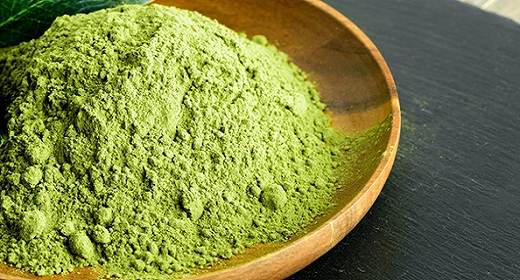by Brittany Wright: Matcha (from the Japanese roots matsu, “to rub,” and cha, meaning “tea”) comes from Japan and has been enjoyed for thousands of years…

Today it’s the hip health trend in town.
Matcha is derived from the green tea leaves of the camellia sinesis plant. This is the same plant used to make green tea. However, matcha leaves are not steeped and discarded, as with typical green tea. Instead, they are ground into a fine powder and mixed into a food or beverage of choice. Since the entire ground leaf is being consumed, rather than just its essence, the health benefits are thought to be compounded.
What Are Matcha’s Benefits?
Many of the beneficial effects of green tea are thought to be related to a unique antioxidant known as a catechin. Catechins are naturally occurring antioxidants found in tea leaves, wine, cocoa, coffee, and berries.
Since matcha tea consumption means ingesting the entire leaf instead of just the steeped fluid, the antioxidant content is higher. One study found that matcha contains between three and 137(!) times the catechins as standard green tea.
Green tea consumption has been linked to:
- Enhanced exercise-induced body fat loss
- Decreased risk of Type 2 diabetes
- Decreased blood pressure
- Healthy weight loss and reduction in overall cholesterol levels
- Cancer
- Neurological diseases, such as Parkinson’s Disease
While more research is needed to determine the optimal dose of matcha tea for daily consumption, this study found that participants who drank four daily cups of steeped green tea experienced a significant reduction of weight and decreased blood pressure.
Remember that matcha tea provides the same components as green tea, though in a more concentrated way. This implies that, if consuming green tea in the form of matcha powder, the same health benefits can be achieved by consuming less than four cups daily.
What Are Matcha’s Potential Risks?
As with any isolated, bioactive plant component, there are some minor potential risks to note regarding matcha consumption. Consult your physician or a registered dietitian before drinking matcha tea if you are:
- Pregnant: Green tea contains caffeine. Matcha tea contains more caffeine than steeped tea, though less than coffee.
- Anemic: If you are anemic, meaning you have low blood-iron concentrations, consumption of matcha tea may make your anemia worse.
3 Ways to Use Matcha
1. Drink Matcha Tea
The most common preparation of matcha is to make it into a warm tea beverage:
- Start with a small amount of matcha powder—typically 1/2 teaspoon. You can always adjust your starting amount of matcha powder to suit your flavor preferences.
- Add warm water slowly, until the matcha forms a paste.
- Top off the beverage with 6 oz. of hot water or nondairy milk of choice. Research shows that casein in cow’s milk protein can bind up the catechins, rendering them ineffective, which is why nondairy milk options are the best for making matcha tea lattes. The water should be close to boiling, but not quite. Matcha paste blends best if you use a whisk to ensure a smooth drink. Traditionally, a bamboo whisk is used.
2. Enhance Favorite Foods
Use matcha to add an earthy, herbal flavor to your favorite dishes. The mildly herbal flavor of matcha pairs well with both sweet and savory foods. Try matcha powder sprinkled into your favorite foods, such as:
- Smoothies
- Popcorn
- Hot breakfast cereals
- Yogurt
- Soups, especially Asian soups such as egg drop or miso
- Stir-fries
- Scrambled eggs
3. Apply Topically
A study found that the topical application of green tea can have beneficial effects on skin, such as reduced risk of skin cancer and reduced inflammation. Take advantage of these potential benefits with a simple, at-home face mask:
- Blend matcha paste with plain yogurt.
- Spread the mixture onto a clean face and neck.
- Let sit for 10 minutes. The matcha may help ease inflammation, while the lactic acid in yogurt helps moisturize and dissolve dead skin cells.
- Rinse with warm water, and follow with a moisturizer.
Despite its minor health risks, green tea—especially matcha—is undeniably a rich source of healthy, plant-based antioxidants. While further research is needed to recommended daily amounts, most people can benefit from green tea consumption. Make yourself a latte or get brave and spread it onto your skin; you will be enjoying a medicinal plant rooted in a long tradition.









































